7 Types of virtual events that boost member engagement
Over the last four years, we’ve all experienced many changes in our daily lives. We’re happy to leave some of these changes in the past (we’re looking at you, “disinfecting our groceries”). But we also love other changes that have come about, like finding ways to create and run fantastic virtual events that members can engage with.
Although live events have made a welcome comeback, creators and brands alike have learned that virtual events can have a similar if not better impact when done well. That means the right content for the right audience—and making sure you’re not on mute.
Hosting online events lets you share your personality and community value beyond a local base of members. For many creators and brands, virtual events have become a trusted way to connect with members, share content, and build a strong, more resilient community.
💻 TLDR; Virtual events are here to stay.
But we wanted to know how events—both IRL and virtual—impact communities, so we asked the experts.
For our 2024 Community Benchmark Report, we spoke with almost 700 community professionals, and more than 40% told us that hosting events was a significant driver of member acquisition for their communities.
The results were even more interesting when we dug into the data on Platinum communities, which have high engagement and low churn compared to the average community.
100% of Platinum community professionals said they credit events—from in-person workshops to virtual panel discussions—to their community's success. Digging deeper, 59% of Platinum community leaders said they host a variety of event types, including virtual events, and have a 50% attendance rate compared to 33% of standard communities.
Keep scrolling to learn about the main benefits of virtual events, seven virtual event examples to try in your community, and a quick checklist on making hybrid, virtual, and in-person events unforgettable.
What is a virtual event?
Planning and hosting a virtual event involves more than setting up a Google Hangout or Zoom meeting. They share much of the same DNA as their in-person cousins, like chimpanzees and humans.
🙈 It might not be 96%, but you get the point.
Virtual events use digital platforms to bring communities together. Instead of having people in the same physical space, many virtual events often use interactive games, chat features, and other online collaboration tools to help members feel engaged and connected. Virtual events can be conferences, webinars, panel discussions, or even block parties.
🏘️ That’s right. Block parties.
Darnell Brown, Founder of Bulletproof Hustle, told our team how hosting a virtual block party helped him make current members feel valued while attracting new people to his growing community. Brown said he opened the virtual community event to the public as a launch party to showcase what Bulletproof Hustle offers.
Virtual events offer more than just a wider audience. They also help you:
- Reduce your costs. Virtual means no spaces to rent, flights to book, or catering to order. Sure, there are fees for using tools like Zoom and Eventbrite, but you save more than hosting IRL.
- Give your attendees more flexibility. Scheduling is tricky, especially for guests who may be back in the office. Virtual events let them join from wherever is most convenient for them, whether that’s an office lounge, their bedroom, or the beach.
- Make your events more accessible. Physical spaces for IRL events aren’t always 100% accessible (although they should be). They also require attendees to travel (near and far, depending on the location and audience). Virtual events create a space where everyone can attend without barriers. Online platforms also let you provide closed captioning of your speakers for attendees living with hearing issues.
7 Types of virtual events to try in your community
Now that you know the benefits of virtual events, let’s look at the different types of events you can use to connect and delight your members, along with some community event examples.
1. Webinars
The original virtual events! Webinars have been around for years, and for good reason. While they’re known for being excellent lead gen tools for marketing and sales, webinars are also fantastic virtual event types for almost every community.
They’re typically one-to-many events where a speaker or panel of experts can easily share content with their audience. The content is often educational and/or inspirational, but the format can also be used to share things like updates and more.
- Why we love them: Beyond being dependable, webinars are also easily recordable to share with community members who can’t make your event live.
- You should try these if: You want to get educational-based content out to your community in the easiest-to-access way possible—and be able to share it with people who can’t join live.
2. Summits and conferences
Virtual summits and conferences are long, sometimes multi-day events. This format lets you share a ton of content with your audience without them having to slog through a long registration line.
Virtual summits often are a combination of many event types—from a mainstage keynote, to tactical webinar-style sessions, to smaller breakout rooms. Some virtual conferences even offer chatroulette-style networking to connect attendees.
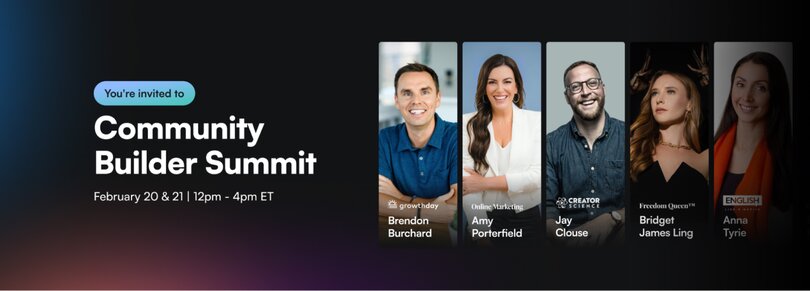
We love running these types of events multiple times per year to support with awareness and conversion!
- Why we love them: IRL conferences are great, except for the unusually tiny coffee cups and awkward standing around until someone introduces you. Done right, virtual summits and conferences give your attendees the same experiences without the lanyards and tote bags. (You could still send tote bags in the mail if you wanted to.)
- You should try these if: You want to build up your brand awareness and reach a large audience. They’re also super effective when paired with larger campaigns or launches!
Tip: Virtual summits take much more planning and preparation, compared to any other event type. Working with another non-competitive brand or partner in your space can help lighten the load, and also allow for cross promotion across audiences.
3. Office hours
Office hour virtual events are open-ended times when you make yourself available to your community. We love running this style of online event in our community!
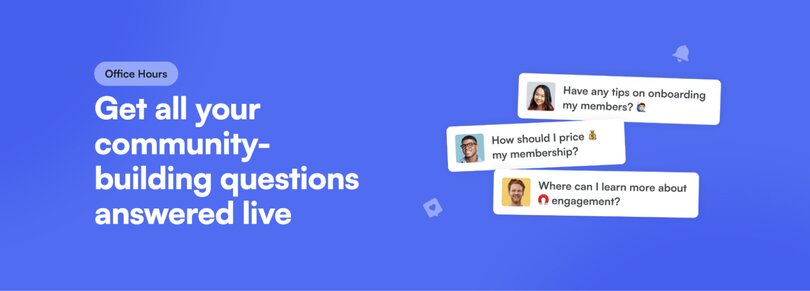
Some virtual office hours have set time blocks for people to sign up for, others are drop-in sessions where you’ll get an eclectic group of people and questions.We’ve also seen communities run these with a set agenda that repeat from one session to the next, while others are more open-ended.
- Why we love them: Your time is valuable, and so is your community’s. Giving them options to book time to chat with you 1:1 or in an open session with a group can help you both get the most out of your time together.
- You should try these if: Community professionals who offer advice, coaching, or mentorship do well with office-hour virtual events. They’re great options for paid communities and do well as lead generation to convert free members to paid members.
Tip: Asking questions one-on-one can be intimidating for some of your members. Using ice breakers or just having a simple of list of prompts or questions can help make your member feel more comfortable, and make their time—and yours—more valuable.
4. Small group discussions
Small group discussions let you bring multiple guests together to share across borders and time zones in real-time. Think of a book club, but online—but you still probably didn’t read the entire book. It’s less of a one-to-many approach, and more about encouraging conversation amongst attendees.
This event type is also sometimes referred to as a mastermind or roundtable.
- Why we love them: Small group discussions can have all the benefits of webinars but give your event a more intimate feeling to promote sharing and connection. They’re also often more easy to prepare for as a host.
- You should try these if: These are perfect if you’re looking for ways to give added value to paying customers or community members. They’re also great for nurturing leads in your funnel, particularly if you take an invite-only approach. It’s a more personalized event type that can help attendees feel engaged and inspired
Tip: Ask attendees to share their questions and/or challenges about the event subject during the signup process. You can then use these questions to help shape the discussion points, and to inspire content topics for your business.
5. Member showcases
This is one of our favorite community event ideas! Member showcases are virtual events where some of your existing members share their experiences in your community and why others should join. These can be panel discussions, individual presentations, or video podcasts.
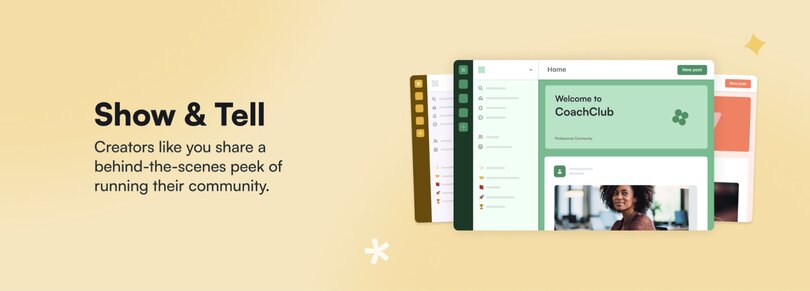
We run Show & Tell events every Friday in our community, and they’ve been a great way to surface more stories that we then turn into articles, social posts, and more. Like this one featuring Mila Clarke!
- Why we love them: No marketing is quite as effective as word of mouth. Member showcase events put your most valuable recruiting tool front and center to tell their story about how your community matters to them.
- You should try these if: Member showcases are great for communities that have cohorts of members going through a program together. A member showcase is an awesome milestone event for your members to show off their progress—and the value your community provides.
Tip: Use your member showcase presentations as the ultimate social media content to generate new leads for your business and/or community. Record the presentations and get permission from your members to share them on your channels (and theirs, if possible).
6. Onboardings and orientations
From giving your new members a tour to introducing them to the tools, programs, and content you offer, a well-designed onboarding session has a greater impact on retention than anything else.
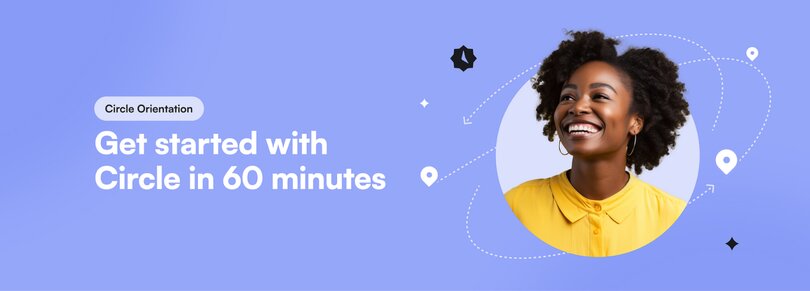
We offer this type of event on a weekly basis in our Circle customer community!
- Why we love them: When we looked at the 2024 Community Benchmark Report data, 1 in 3 standard creators thought they were doing a decent job at onboarding, but only 13% of them said it was a priority for 2024. On the other side, over a third of Platinum creators said it was one of their highest priorities. This is a great type of event to run regularly, particularly if you have a product that requires some initial training.
- You should try these if: You have a wide geography for membership. Virtual onboardings let you bring people together from where they’re comfortable—plus, you can record your sessions to offer refreshers when needed.
Tip: Onboarding virtual events can be great, but they can also be challenging to follow along with. Try providing your members a printable PDF checklist or agenda to have in front of them as they participate in the virtual presentation.
7. Workshops
Live workshops are a fantastic style of event that can help members work through a challenge, tactic, or goal in a group setting.
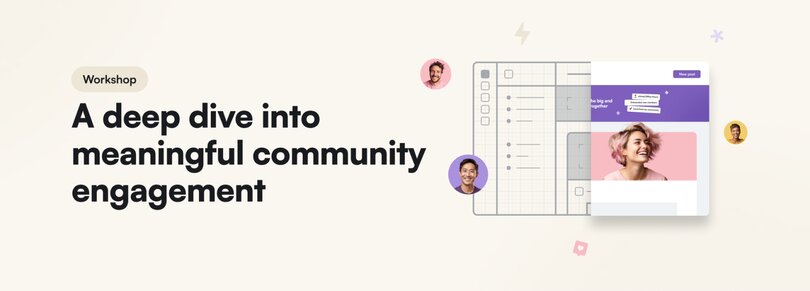
Similar to webinars, workshops tend to be more educational based. The main difference is that members are encouraged to take action! This could mean that they are filling out a worksheet during the event, discussing tactics in smaller breakout groups, or just continuing the learning process async after the workshop event.
- Why we love them: Workshops are a great educational event format. Where webinars can inspire and educate on a given topic, workshops take it a step further to help attendees actually take action!
- You should try these if: Your community or audience has shown interest in your educational-based content.
Tip: Try turning your existing content into a workshop! If you’ve got an educational article or video, a longer course, or a guide—chances are you’ve got the core content you need to create a live workshop.
How to make hybrid events work
Virtual and IRL events are great—but sometimes, you may want to run a hybrid event for your community. Making hybrid events work well takes a little extra planning to ensure you deliver amazing experiences for people in the room and those online.
Here are our tips to create a memorable hybrid event for all audiences:
- Q&A. It can be challenging to get your in-person and online audiences and speakers to hear each other clearly. Consider offering text-based Q&A for your online audience to ensure their questions are heard.
- Test. Test again. Nothing’s worse than your online audience being unable to see or hear a video playing. Test your in-person and online setup before your event starts.
- Remember both audiences. Acknowledge both audiences throughout the event. You don’t want either to feel like second-class guests.
Ready to get virtual?
Virtual events can expand your audience to gain new members and increase the value of your community for existing ones. Check out this post if you’re searching for advice on running your next community event!
Community pros choose Circle.
Looking for the best way to bring your community together wherever they
are? Circle is here to help you create virtual events that make your
community shine..
Start your free 14-day trial today!